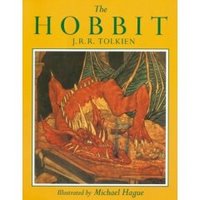The Hobbit, J. R. R. Tolkien

The Hobbit
This was a fun book to finally read with my boys (which was also my first reading of the book as well). This book, like most it seems, did start a bit slowly, but my boys really loved it once it got going. It helped that there was some built in anticipation because we have talked about this book and the Lord of the Rings for a little while. A good friend gave us a very nice deluxe edition of the Lord of the Rings Trilogy about a year ago so that has added to the anticipation.
The story speaks to various important themes including courage/nobility, pluck, teamwork, simplicity, and the danger of greed. Tolkien, of course, is not writing an allegory (in contrast to Lewis’ Narnia) so we are not to look for direct connections to the gospel. However, he has created a meaningful world, so there are connections to biblical truths about living. As has been said, all the truly great stories are great because they resemble at some level the story- the drama of redemption.
In The Hobbit each character has his flaws, so we see real ‘people’ dealing with the issues of life, encountering fears and temptations. This opens up numerous possibilities for conversations with your children. As the characters travel through the Mirkwood the challenge is to remain on the path in obedience to their directions, acting in faith in spite of their feelings and resisting distractions ( The earnest command to stay on the path is reminiscent of Pilgrim’s Progress) This was very relevant for some issues with our boys. The dragon of course is the picture of evil. The reading is all the more meaningful if you are aware of the traditional associations of the dragon- evil, greedy, and wily. There is a strong message about greed as the dragon is the greedy one and then when the treasure is captured greed affects those who have obtained it. In fact, the dwarf leader, Thorin, eventually says to Bilbo, “If more of us valued food and cheer and song above hoarded gold, it would be a merrier world.” (272-73).
Then as the story closes there is almost a surprise at the end as Gandalf mildly chides Bilbo for seeming not to be surprised at the fulfillment of the prophecies.
“Of course!” said Gandalf. “And why should not they prove true? Surely you don’t disbelieve the prophecies, because you had a hand in bringing them about yourself? You don’t suppose, do you, that all your adventures and escapes were managed by mere luck, just for your sole benefit? You are a very fine person, Mr. Baggins, and I am very fond of you; but you are only quite a little fellow in a wide world after all!” (290)
So, the story closes by affirming that something more is at work here than simply one creature having an incredible journey- the old prophecies are coming true. Exactly what Tolkien was up to here, I am not sure. But from a Christian standpoint, this opened up conversation about how God works history to His ends, how he still uses us in the process, and how our lives are about more than just us. We are playing our part in the bigger drama of God’s working in history.
Lastly, the edition we used (the one pictured above) has some really nice illustrations which my boys enjoyed checking out between readings.
Added note: At the time of this reading my boys are 9, 8, 6 (also a three year old but he was not much into it!). They all enjoyed it and followed well. I think the 6 year old might not have followed as well if it were not for older brothers. Perhaps that will help in your thinking about when this book might be good for your children.


2 Comments:
Ray, thanks for providing this site, a real gem for those of us who are seeking to establish a good reading habit with our children.
Is there any possibility you could do a post or series of posts on how you go about this wonderful habit of reading with your children.
Is bedtime the time for your reading with them? Do you read with each one individually or together? Do you have discussion time? How long do you read with them each night? How has your reading times with them developed/changed over time? What are your recommendations for families just beginning this discipline? etc.
Thanks!
Good idea Brett. Thanks!
I will plan to take this up soon.
Post a Comment
<< Home